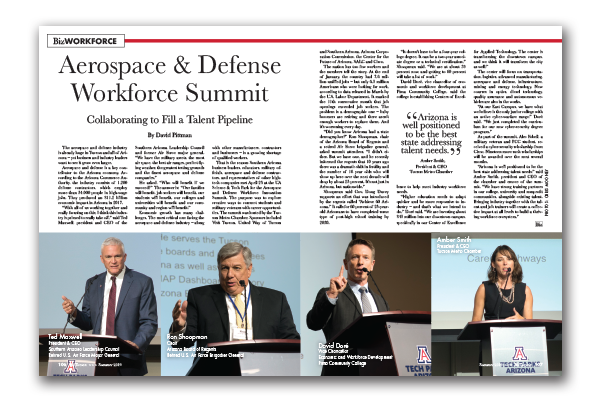
Aerospace & Defense Workforce Summit
By David Pittman
Collaborating to Fill a Talent Pipeline
The aerospace and defense industry is already huge in Tucson and all of Arizona – yet business and industry leaders want to see it grow even larger.
Aerospace and defense is a key contributor to the Arizona economy. According to the Arizona Commerce Authority, the industry consists of 1,200 defense contractors, which employ more than 54,000 people in high-wage jobs. They produced an $11.2 billion economic impact in Arizona in 2017.
“With all of us working together and really focusing on this, I think this industry is primed to really take off,” said Ted Maxwell, president and CEO of the Southern Arizona Leadership Council and former Air Force major general. “We have the military assets, the most air space, the best air ranges, perfect flying weather, the greatest testing grounds and the finest aerospace and defense companies.”
He asked, “Who will benefit if we succeed?” The answer is: “Our families will benefit, job seekers will benefit, our students will benefit, our colleges and universities will benefit and our community and region will benefit.”
Economic growth has many challenges. The most critical one facing the aerospace and defense industry – along with other manufacturers, contractors and businesses – is a growing shortage of qualified workers.
That is the reason Southern Arizona business leaders, educators, military officials, aerospace and defense contractors, and representatives of other high-tech companies met April 25 at the UA Science & Tech Park for the Aerospace and Defense Workforce Innovation Summit. The purpose was to explore creative ways to connect students and military veterans with career opportunities. The summit was hosted by the Tucson Metro Chamber. Sponsors included Visit Tucson, United Way of Tucson and Southern Arizona, Arizona Corporation Commission, the Center for the Future of Arizona, SALC and Cisco.
The nation has too few workers and the numbers tell the story. At the end of January, the country had 7.6 million unfilled jobs – but only 6.5 million Americans who were looking for work, according to data released in March by the U.S. Labor Department. It marked the 11th consecutive month that job openings exceeded job seekers. The problem is a demographic one – baby boomers are retiring and there aren’t enough workers to replace them. And it’s worsening every day.
“Did you know Arizona had a state demographer?” Ron Shoopman, chair of the Arizona Board of Regents and a retired Air Force brigadier general, asked summit attendees. “I didn’t either. But we have one, and he recently informed the regents that 10 years ago there was a dramatic shift in fertility and the number of 18 year olds who will show up here over the next decade will drop by about 25 percent. It’s not just in Arizona, but nationwide.”
Shoopman said Gov. Doug Ducey supports an effort that was introduced by the regents called “Achieve 60 Arizona.” It calls for 60 percent of 25-year-old Arizonans to have completed some type of post-high school training by 2030.
“It doesn’t have to be a four-year college degree. It can be a two-year associate degree or a technical certification,” Shoopman said. “We are at about 34 percent now, and getting to 60 percent will take a lot of work.”
David Doré, vice chancellor of economic and workforce development at Pima Community College, said the college is establishing Centers of Excellence to help meet industry workforce needs.
“Higher education needs to adapt quicker and be more responsive to industry – and that’s what we intend to do,” Doré said. “We are investing about $45 million into our downtown campus, specifically in our Center of Excellence for Applied Technology. The center is transforming the downtown campus, and we think it will transform the city as well.”
The center will focus on transportation, logistics, advanced manufacturing, aerospace and defense, infrastructure, mining and energy technology. New courses in optics, diesel technology, quality assurance and autonomous vehicles are also in the works.
“At our East Campus, we have what we believe is the only junior college with an active cyber-warfare range,” Doré said. “We just completed the curriculum for our new cyber-security degree program.”
As part of the summit, Alec Fobeil, a military veteran and PCC student, received a cyber-security scholarship from Cisco. Nineteen more such scholarships will be awarded over the next several months.
“Arizona is well positioned to be the best state addressing talent needs,” said Amber Smith, president and CEO of the chamber and emcee of the summit. “We have strong training partners in our college, university and nonprofit communities, alongside existing talent. Bringing industry together with the talent and job trainers will create a collective impact at all levels to build a thriving workforce ecosystem.”





